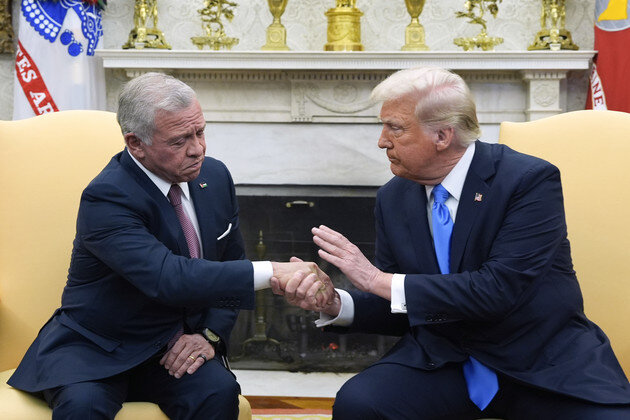Jordan’s king buys more time on Trump’s Gaza plan with flattery

Jordan’s King Abdullah II, the first Middle Eastern leader to meet with President Donald Trump since he announced his intention to take over the Gaza Strip, deflected questions about the plan to displace Palestinians as he tried to avoid a public face-to-face confrontation with Trump.
Abdullah, who dismissed Trump’s Gaza proposal when it was announced last week, told Trump at the White House on Tuesday — with members of the press in the room — that he would accept 2,000 sick Palestinian children from Gaza while punting the question of broader resettlement to Egypt.
Trump, who threatened Monday to withhold U.S. aid to Jordan if the country continued its opposition to taking in masses of Palestinians of all ages, appeared placated by the king’s more limited overture during Tuesday’s Oval Office meeting.
“That’s really a beautiful gesture. That’s really good, and we appreciate it,” Trump said. “That’s music to my ears.”
The tactical move by Abdullah — whose country is the third-largest recipient of U.S. aid and adamantly opposed to becoming a homeland for displaced Palestinians – may succeed in lowering tensions between the two allies while buying more time.
There’s broad opposition to relocating Palestinians out of Gaza in Jordan and across all Arab nations in the region. But Egypt and other countries are coordinating a regional strategy aimed at satisfying Trump’s desire to force a resolution to the humanitarian crisis in Gaza, which has been ravaged by 15 months of war with Israel.
Abdullah was careful to articulate a broader willingness to work with Trump, flattering him by suggesting the president could be a historic peacemaker.
“With all the challenges that we have in the Middle East, I finally see somebody who can take us across the finish line to bring stability, peace and prosperity to all of us in the region,” Abdullah said while seated beside Trump. “It is our collective responsibility in the Middle East to continue to work with you, to support you, to achieve those lofty goals.”
Abdullah demurred when asked directly about whether he wanted the U.S. to take over the Gaza Strip, suggesting he needed to wait until Egypt presented its plan. Trump said last week he wanted to control the territory and turn it into “the Riviera of the Middle East,” though officials inside the administration say they have not drafted an actual plan.
During the public portion of his meeting with Jordan’s king, Trump gave no ground on his proposal to relocate nearly 2 million Palestinians and for the U.S. to lead a private redevelopment project in Gaza, although he struggled to explain how America would control the area or under what authority, stating flatly — and falsely — that “nobody would question it.”
Trump also expressed optimism that his plan, which many in the region see as ethnic cleansing, would bring peace to a region long at war.
“It’s going to work out,” Trump said, promising that Palestinians will be “living beautifully in another location.”
Most importantly for Jordan’s king, Trump backed away from his threat just a day earlier to withhold aid.
“We contribute a lot of money to Jordan and to Egypt, by the way. A lot to both,” the president said. “But I don’t have to threaten that, I think we’re above that.”
Trump did not back off his more bellicose stance toward the armed Hamas group, which he threatened with “all hell” should Hamas not return nine more hostages by Saturday as promised. He suggested that the group appeared to be “playing cute” and said they were trying to be bullies.
“A bully,” Trump added, “is the weakest person.”
But Trump’s own ultimatum and threatening rhetoric could help Israel create a pretext for ending the fragile cease-fire with Hamas. And despite Abdullah’s careful diplomacy at the White House, Trump’s unbending commitment to a plan critics have described as disingenuous and unrealistic is threatening broader stability across the Middle East, and putting a number of Arab allies in a difficult position.
Jordan, for instance, has experienced years of tensions between citizens of Palestinian descent and those who are not. As Trump spoke at length about his vision for the Middle East, Abdullah, blinking heavily, offered no pushback with the press in the room.
Marwan Muasher, a former Jordanian foreign minister who helped negotiate Jordan’s 1994 peace treaty with Israel, said last week that accepting masses of Palestinians is a non-starter for his country and would represent an “existential” threat. “This is not an economic or a security issue for Jordan, it’s an identity issue,” Muasher said.
Beyond that, many Jordanians sympathetic to the plight of Gazans fear that agreeing to Trump’s proposal would be tantamount to giving up on the creation of a Palestinian state and denying Palestinians’ “right of return” to land they fled in 1948 and 1967.
Those issues are at the heart of a bill introduced in the Jordanian parliament last week to ban the resettlement of Palestinians in the kingdom. The draft law, according to the text, “reaffirms Jordan’s official and popular rejection of any plan to displace Palestinians to Jordan as an alternative homeland. Jordan is for Jordanians, and Palestine is for Palestinians.”
Ahmed Sharawi, a Middle East expert at the Foundation for Defense of Democracy, predicted that Abdullah would warn Trump more directly behind closed doors that “his resettlement idea will destabilize the Middle East, jeopardize Jordan’s peace with Israel, and even threaten the kingdom’s stability.”
But since taking office for the second time, Trump has shown little restraint in his efforts to pressure allies to agree to his terms. Asked in the Oval Office under what legal authority the U.S. could take control of Gaza, a “sovereign territory,” the president made clear he wasn’t concerned.
He responded: “Under the U.S. authority.”
(Source: Politico)
